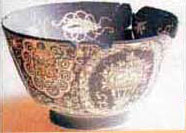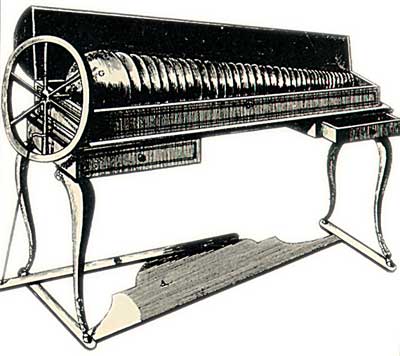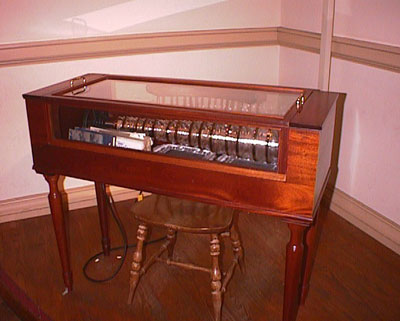

Temple's Diary
A Tale of Benjamin Franklin's Family
In the Days Leading up to The American Revolution
Grandfather turns seventy today. At first I thought that there would be no celebration, given the lingering sadness about Hannah, but the boys have been looking forward to this day with such excitement that the family decided to invite a few friends. Life goes on, as people say, and Aunt Sally has just informed us that a new little life is to appear in late October. A baby girl, we hope.
What could please Grandfather today more than Indian pudding, punch, and music, right here in his freshly re-papered music room? I must admit that I hardly ever set foot in that room because it has been discovered with surprise, by one and all, that I have absolutely no musical ability. I sing out of tune, I cannot tell one melody from another, my aunt and uncle's efforts to teach me a little something have been totally frustrated, while all of them delight in performing solo or together.
And so, I am put in charge of pouring the refreshments and was shown the family's precious recipe of:

ORANGE SHRUB "To a gallon of rum, add two quarts of orange juice and two pounds of sugar. Dissolve the sugar in the juice before you mix it with the rum. Put all together in a cask and shake it well. Let it stand 3 or 4 weeks and it will be very fine, fit for bottling. When you have boiled off the fine, pass the thick thro' a philtering paper put into a funnel, that not a drop may be lost."
(Between us, I must confess that I filled a little glass with this fragrant brew and swallowed it when no one was looking. It was AWFUL! It burned my tongue, my throat, my stomach, and all the way down to my feet. Horrible! Don't try it, descendants!)
The platter of choice for the festive table would have been Grandfather's favorite cheese, a big wheel of English Stilton. Impossible, these days of non-importation. So Aunt Jane and Aunt Sally outcooked each other in a stupendous variety of muffins, biscuits, cakes and, of course, Indian pudding — each aunt producing her own recipe.
Grandfather, not about to miss his morning committees, comes back in the afternoon and proceeds straight to the music room to tidy up the scores and lyrics of the songs he brought back from England: the catch songs, about which Mrs. Stevenson once told me with a wink that they are always humorous and often use naughty words (all sung by male voices, of course) and the glee songs, vocalized by at least three men. These have more to do with romance and are all the rage in present-day London. (I bet Willy will catch on to the naughty words before anybody else in the room.) Grandfather belonged to several singing clubs in London and it should give him great pleasure to hear them sung by American voices this afternoon.
But the real object of his pride will be, as always, his latest brainchild, his glass armonica. I am spelling it his way, without the initial h.
 Franklin's Glass Armonica
Franklin's Glass Armonica— "Why no h, Grandfather? It looks funny."
— "Because it is my tribute to the Italians who have done so much for music and have no h in their alphabet. The glass armonica is my favorite invention."
— "More than the lightning rod? More than the stove? More than ..."
— "More than any other, I tell you. Because it gives me and a whole lot of other people — including the ladies — a great amount of pleasure. Some well-known musicians have already started to compose for it. To be honest, Temple, I must tell you that it is not entirely my invention. People have known for centuries that you can produce melodious sounds by rubbing a moistened finger around the rim of a glass, and also that you can modify that sound by using more or less liquid inside the glass, or by experimenting with its size and thickness. No, I was not the first inventor, but I made big improvements, for instance by replacing the early system of drinking glasses arranged on a table. I use instead a rotating spindle on which nesting glass bowls of increasing size can each produce a specific note. People rave about the sound coming out of that instrument: they call it warbling, they call it celestial. I'm still tinkering with it in my few spare moments. Your aunt Sally already plays it quite well, but her real talent, as we know, is for the harpsichord."
Why, oh why did I have to fall into such a musical family, I wonder.

When the guests arrive, they are taken on a guided tour of the music room. They marvel at the armonica, of course, and at the elegant harpsichord, after which they admire a viola da gamba, a harp, a Welsh harp (smaller model), a set of tuned bells, a spinet, and a splendid Chinese gong.
We hear solos, duets, trios, with Uncle Richard revealing an unexpected talent on the viola da gamba. Warmed up by the orange shrub I am liberally passing around, the guests join in many a drinking song, some of them going back to the youth of this aging group, some just imported from London. Surrounded by his old friends, Grandfather is beaming. I think that what he particularly loves about music is the conviviality it creates, a glowing comradeship in which he basks.
And to top it off, after the candles have been lit, they sing Grandfather's absolute favorites, the traditional Scottish songs, so sad and so moving in their simplicity. The grand climax is Sae Merry As We Twa Hae Been (So Merry We Two Have Been), at which point Aunt Jane joins in, with tears running down her wrinkles.
Forgetting for a moment her duties as a hostess, aunt Sally asks that they sing My Plain Country Joan ("It's Father's love song to my mother," she whispers in my ear.) And they all raise their voices:
Of all the Chloes and Philisses Poets may prate
I sing my plain Country Joan
Now twelve years my wife, Still the joy of my life,
Bless'd day that I made her my own.
Not a word of her face, her shape, or her eyes,
Of flames or of darts shall you hear,
Tho' I beauty admire, 'tis virtue I prize,
That fades not in seventy years.
In health a companion, delightful and dear,
Still easy, engaging and free,
In sickness no less than the faithfullest nurse
As tender as tender can be.
In peace and good order my household she keeps
Right careful to save what I gain
Yet cheerfully spends and smiles on the friends
I've the pleasure to entertain.
Am I laden with care, she takes off a large share,
That the burden never makes me to reel
Does good fortune arrive, the joy of my wife
Quite doubles the pleasure I feel.
Were the fairest young princess, with millions in purse
To be had in exchange for my Joan,
She could not be a better wife, might be a worse,
So I'll cling to my lovely old Joan!
Here, descendants, this poem is my gift to you. If, unlike me, you have a good singing voice, you'll be able to delight your wife with this song on your wedding anniversary. The music, says Aunt Sally, is to be found in The Musical Century, or One Hundred English Ballads, published by Henry Carey in London, 1737.